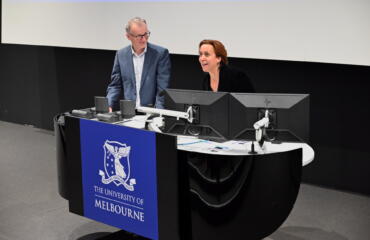Victorian Upper House member Fiona Patten is very well known as the firebrand of progressive politics, the alternative to the alternative that is the Greens.
Her primary vote of 2.88 per cent in last year’s State Election translated into success, granting her the fifth and final seat in the Northern Metropolitan Region.

After so many elections running as a Sex Party candidate (last year was her fifth tilt in as many years), her victory might easily be construed as a long time coming, but Ms Patten herself is happy with her party’s electoral progress.
“In the scheme of things, five years is not very long to found a party then win a seat,” she says.
With seven sitting weeks behind her, Ms Patten reflects on her time in Parliament so far – and her impression of politics from the inside, in contrast to her past role as a lobbyist.
Ms Patten spent 12 years championing the rights of sex workers, seeking government assistance and being on the lookout for allies with a helping hand.
As an outsider, she forged plenty of contacts in government; so many, in fact, that when she was elected in 2014 she found herself alongside other MP newbies who had been political staffers whom she had once lobbied.
Now that she’s in Parliament, she has plenty of people to talk to both inside and out, having as many as 30 meetings a week with community advocates, lobbyists or anybody else that sees value in getting to know an ambitious MLC that’s well placed.
Clearly, the attention isn’t proving problematic. Speaking from her own pre-parliamentary experience, she concedes: “Crossbenchers are more interesting to lobby.”
Amid such a colourful Legislative Council, Ms Patten isn’t restricted to simply negotiating between the Government and Opposition. She has plenty of potential allies alongside her with whom she can collaborate.
During the course of our short interview, no fewer than 10 Parliamentarians stop to greet the savvy newcomer. It’s clear she is well placed, and well liked.
“Yes, they love my vote,” she says, before adding with a smile: “If the make-up was different [and the Government had a solid majority], I don’t think they’d take my calls as regularly.”
“It made me recognise the work that’s involved with being on the other end, because I’m the one being lobbied now. I have a greater appreciation for Members of Parliament saying ‘I can’t meet you for a few weeks’ . . . I [used to think] that was ridiculous [but] I understand now just what their diaries are like.” — Fiona Patten
The 51-year-old, whose background is in social work via fashion design, explains that the Andrews Government only needs two of the five crossbenchers to get legislation through the Upper House once it already has the Greens onside.
In response, the five had decided to work together to ensure the government needed to keep them all in the loop rather than simply pick off the necessary two votes while ignoring the others.
That suggests that all five Upper House crossbenchers (aside from the Greens) are better organised than many observers might have reasonably predicted of such a colourful and disparate political band.
“The five of us meet regularly,” says Ms Patten. “There’s no alliance there or bloc, but we want to support each other.”
The five retain their individuality, with each voting his or her own way, she adds. But with all five regularly meeting, the government cannot divide and conquer quite so easily.
Ms Patten says she maintains a productive relationship with all of her crossbench compatriots.
“James [Purcell, of Vote 1 Local Jobs] and I are both fairly pragmatic about the fact that the government does have a mandate to govern . . . We’re not here to stymie.”
Although, she notes, as if to emphasise the watchdog aspect of her new role: “I keep a copy of the government’s election promises on my desk.”
Ms Patten is even positive about her working relationship with Rachel Carling-Jenkins, her Democratic Labour Party counterpart who represents the Western Metropolitan Region.

The Sex Party and the DLP probably have the same issues front-and-centre but come at them “from completely opposite ends” of the political spectrum, says Ms Patten. The Sex Party campaigns in favour of same-sex marriage and abortion rights: two things the DLP opposes strenuously.
While the votes of Ms Patten and Ms Carling-Jenkins cancel each other out on those issues, Ms Patten nominates ‘end of life’ issues as something in which the Sex Party, the DLP and even the Shooters and Fishers Party had been able to find common ground.
The Victorian Greens, says Ms Patten, had introduced a motion to look into voluntary euthanasia – something the government, and many of the crossbenchers, had not been keen to explore.
In response, the Sex Party introduced a separate motion on dying with dignity that looked into more than just voluntary euthanasia, such as advance directives and palliative care.
“Having a broader scope meant I could bring along my colleagues in the Shooters and Fishers and even the DLP,” says Ms Patten. “They [the other crossbenchers] have been very willing. They all supported [the Sex Party motion], even the DLP which is anti-voluntary euthanasia. The DLP and the Shooters were not going to support the Greens motion, but were happy to support it in a broader way.”
Ms Patten is confident the dying with dignity bill will prosper, while getting to this point had amounted to an early and unexpected success.
“Both the government and the opposition understand that this is not a minority issue . . . the community is ready.”
The benefits of being a former lobbyist are not lost on Ms Patten, the only Sex Party parliamentarian in Australia.
“As a small party we’re now able to become more prominent in the electorate . . . I like the Upper House because it’s a place of review – bigger picture. For the Sex Party’s broader platform it’s better. We don’t have the ambitions of the Greens to form a government.” — Fiona Patten
“Being able to run into people in a more informal manner does enable you to get your point across more easily.”
Having experienced both sides of the negotiating table, she recognises opportunity and frustration on each. Now faced with lobbyists sitting opposite, her new role has given her an appreciation of the stresses placed on elected officials.
“It made me recognise the work that’s involved with being on the other end, because I’m the one being lobbied now. I have a greater appreciation for Members of Parliament saying ‘I can’t meet you for a few weeks’ . . . I [used to think] that was ridiculous [but] I understand now just what their diaries are like.”
And yet, the speed of parliamentary processes continue to frustrate her, encapsulated in her remark: “The beauty of italics.”
She explains that despite both houses of Parliament having so much work to get through, it had been frustrating seeing how much time was spent debating minor issues that had little real world value for Victorians – such as parliamentary procedures and the formatting of documents. The passage of legislation and procedure was much slower than she had anticipated.
With so many MLCs neither aligned to the Government or Opposition, Ms Patten believes changes are needed to allow the increasingly colourful Upper House give its members adequate time to air their concerns.
“I think with the changing nature of the Upper House . . . there should be more consideration towards giving the crossbench more time to raise issues and lead the debate.”
One quarter of the chamber – 10 of the 40 available seats – is now occupied by crossbenchers.

“Wednesdays are put aside for non-government business,” says Ms Patten. “So it effectively ends up being about four hours [in a sitting week].”
Ms Patten says that with so little time allotted for non-government business, each crossbencher could reasonably expect just three opportunities a year to put up a motion.
“Actually, it’s probably less than that . . . just last Wednesday we [the whole Upper House] only got two motions up . . . No, we got one.”
Put simply, she reckons Parliament moves way slower than it should.
Now that the Sex Party finally has a seat, Ms Patten wants to hang onto it, simply because she has multiple terms’ worth of work to get through, she says.
“As a small party we’re now able to become more prominent in the electorate . . . I like the Upper House because it’s a place of review – bigger picture.
“For the Sex Party’s broader platform it’s better. We don’t have the ambitions of the Greens to form a government.”



